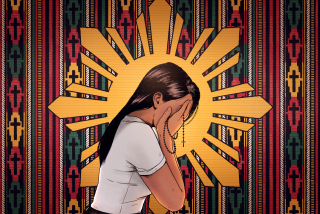All Christians’ Prayers Ascend to Same Place
A family carried their sick daughter into an Orange County hospital in the middle of the night. A medical team quickly assembled and assessed the condition. The young girl would need immediate surgery. The parents consented and prayer from the chaplain was requested.
The chaplain was paged and came directly to the ward. She listened as the distraught and unprepared parents recounted the heartbreaking details.
The chaplain then asked what they specifically wanted to pray for, realizing that different people pray for different things. One can pray for healing, comfort, peace, patience, God’s will, wisdom, or even release.
The chaplain asked how they addressed God. She asked if there were specific prayers they wanted to recite. She asked if they wanted to pray out loud or silently, or if they wanted her to pray for them. Finally, she led them in a prayer customized for their needs.
At the end of the prayer, a medal hanging from the chaplain’s neck became visible as she leaned over to hug the mom.
“Oh, are you Catholic?” the mom exclaimed. “You prayed just like we do!”
The difference in Christian prayer traditions can be traced back to Martin Luther. When he broke with the Roman Catholic Church and nailed his 95 theses to the cathedral door, he began the Great Divide, commonly known as the Reformation. Unfortunately, that division has kept multiplying into the many denominations we have today. Hence the need for the chaplain’s sensitivity.
This year, Reformation Day, which is Tuesday, is different from any Reformation Day in history. Instead of celebrating the break with the Catholic Church, this year some Christians are celebrating a consensus in the basic truths of the doctrine of justification, having agreed that people are saved by faith, demonstrated through good works. The 500-year-old theological issue has finally been laid to rest. The Joint Declaration was signed on Reformation Day 1999, uniting Lutherans and Catholics.
Just before he died, Jesus prayed fervently for his followers, “[T]hat they may be one, as you and I are one, Father.” (John 17:11) Pope John Paul II is similarly calling Catholics to join with all baptized people to work toward reconciliation. He stated, “We realize that we are brothers who are still divided, but with a firm determination we have placed ourselves on the path that will bring us toward full unity in Christ.”
Let us remember that ecumenism does not alter the truth of what we believe or compromise our cherished traditions. It is a desire to settle the scandal of estranged relations and to understand what our neighbor believes. It speaks of an unrealized potential.
Pope John Paul II has said that after this, the Jubilee Year, is over, his first priority will be ecumenism. Let us pray that others will make it their priority too.
On Faith is a forum for Orange County clergy and others to offer their views on religious topics of general interest. Submissions, which will be published at the discretion of The Times and are subject to editing, should be delivered to Orange County religion page editor William Lobdell.
More to Read
Sign up for Essential California
The most important California stories and recommendations in your inbox every morning.
You may occasionally receive promotional content from the Los Angeles Times.










